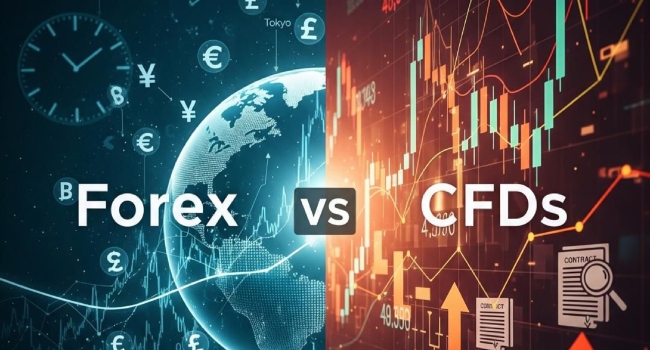Alright, so you’re scrolling through trading forums, getting bombarded with terminologies about Forex and CFDs, and you’re wondering—what’s the real difference, and why should you even care? Let’s cut through the noise and get real.
Key features of Forex trading:
- Underlying Asset: Actual currencies.
- Market Hours: 24/5 global market.
- Leverage: Typically high (up to 1:30 or more for retail traders, depending on jurisdiction).
- Trading Platforms: Usually offered by specialized Forex brokers.
Key features of CFD trading:
- Underlying Assets: Wide range, including stocks, commodities, indices, cryptocurrencies, and Forex.
- Market Hours: Varies depending on the underlying asset.
- Leverage: Usually high, but regulated differently across regions.
- Trading Platforms: Provided by CFD brokers, often integrated with multiple asset classes.
Forex is basically the heavyweight champ of the trading world. We’re talking over $7 trillion changing hands every day. Yeah, trillion, with a T. It’s all about currencies. You are trading actual currency pairs; no physical delivery occurs. You’re buying one, selling another, and hoping you guessed right about which one’s going to flex harder. The market never really sleeps—open 24/5—so there’s always action somewhere, whether you’re an early bird or a night owl.
If you’re into following economic drama, central banks, or global shenanigans, Forex is your playground. Buy EUR/USD if you think the euro’s about to crush it, or sell if you think the dollar’s gonna clap back. It’s that straightforward (well, kinda). Forex risks include currency volatility, geopolitical events, and economic data releases.
Now, CFDs (Contracts for Difference) are like the multi-tool of trading. You want to dabble in stocks, gold, crypto, indices, or even Forex—all from one account? CFDs got your back. You never actually “own” anything; you’re just betting on price moves. If you’re right, you pocket the difference. If not, well…you get to suffer losses. Some countries keep CFDs on a tight leash (regulation-wise), so check your local rules before diving in. CFD traders face similar risks to Forex traders, but additionally include counterparty risk. Since CFDs are over-the-counter (OTC) products, there is the possibility that the broker might default or face insolvency.
Honestly, it’s like asking if you should have pizza or tacos for dinner. Both are awesome, but it depends on what you’re hungry for.
Go with Forex if:
- You’re all about currencies. No distractions, just the world’s money.
- You like tight spreads and loads of liquidity. You want in and out, fast.
- Macroeconomics is your jam—you’re tracking news, central banks, all that jazz.
Pick CFDs if:
- You get bored easily and want to trade anything—stocks, oil, Bitcoin, you name it.
- Diversifying sounds good, or maybe you want to hedge your bets.
- You want to go long or short on a bunch of stuff, all in one place.
Most Forex brokers and CFD brokers use similar platforms (like MetaTrader 4/5 or proprietary software) and may even operate under the same license. This can give traders a sense of familiarity and security. The way they make money, though, can shift. Forex brokers usually pocket spreads or commissions, charging a fixed or variable fee per trade. Some send your trades straight to the big boys (liquidity providers), so spreads get tighter. CFD brokers might act as market makers—sometimes with zero commission, but watch out for wider spreads and those sneaky overnight fees. These fees can add up over time and influence your overall profitability.
A Few Must-Knows Before You Dive In:
- Regulation matters. Pick a broker that’s actually watched by someone. You don’t wanna get scammed.
- Leverage rules change depending on where you live. Don’t get greedy and blow up your account.
- Learn before you burn—seriously, strategy and risk management aren’t optional.
At the end of the day, both Forex and CFDs are just tools. One’s a scalpel, the other’s a Swiss Army knife. If you love currencies and economic plot twists, stick with Forex. Craving more variety? CFDs are your ticket.
Both markets often offer leverage, amplifying both potential gains and losses. However, the levels and regulations differ. The real power move? Build a strategy that fits YOU, not just what some influencer on YouTube is hyping.
Finally, trading is risky. Don’t throw in your rent money. Only trade what you can afford to lose, or you’ll end up with a “learning experience” you definitely didn’t want.
Good luck out there—may your trades be ever in your favor.





